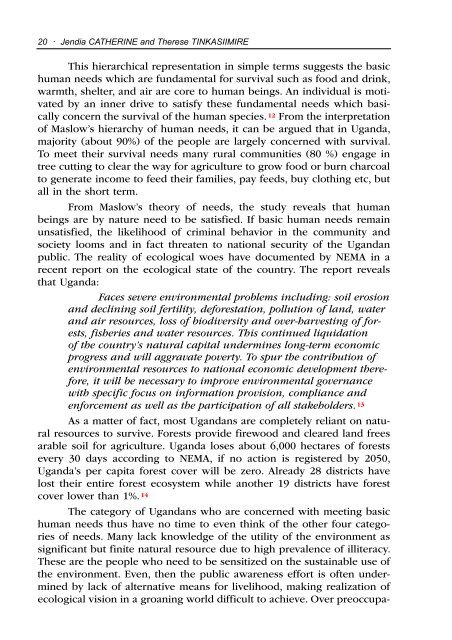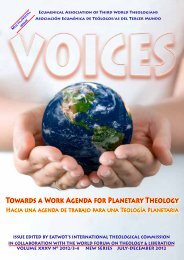voices-2013-2&3 - EATWOT's International Theological Commission
voices-2013-2&3 - EATWOT's International Theological Commission
voices-2013-2&3 - EATWOT's International Theological Commission
Create successful ePaper yourself
Turn your PDF publications into a flip-book with our unique Google optimized e-Paper software.
20 · Jendia CATHERINE and Therese TINKASIIMIREThis hierarchical representation in simple terms suggests the basichuman needs which are fundamental for survival such as food and drink,warmth, shelter, and air are core to human beings. An individual is motivatedby an inner drive to satisfy these fundamental needs which basicallyconcern the survival of the human species. 12 From the interpretationof Maslow’s hierarchy of human needs, it can be argued that in Uganda,majority (about 90%) of the people are largely concerned with survival.To meet their survival needs many rural communities (80 %) engage intree cutting to clear the way for agriculture to grow food or burn charcoalto generate income to feed their families, pay feeds, buy clothing etc, butall in the short term.From Maslow’s theory of needs, the study reveals that humanbeings are by nature need to be satisfied. If basic human needs remainunsatisfied, the likelihood of criminal behavior in the community andsociety looms and in fact threaten to national security of the Ugandanpublic. The reality of ecological woes have documented by NEMA in arecent report on the ecological state of the country. The report revealsthat Uganda:Faces severe environmental problems including: soil erosionand declining soil fertility, deforestation, pollution of land, waterand air resources, loss of biodiversity and over-harvesting of forests,fisheries and water resources. This continued liquidationof the country’s natural capital undermines long-term economicprogress and will aggravate poverty. To spur the contribution ofenvironmental resources to national economic development therefore,it will be necessary to improve environmental governancewith specific focus on information provision, compliance andenforcement as well as the participation of all stakeholders. 13As a matter of fact, most Ugandans are completely reliant on naturalresources to survive. Forests provide firewood and cleared land freesarable soil for agriculture. Uganda loses about 6,000 hectares of forestsevery 30 days according to NEMA, if no action is registered by 2050,Uganda’s per capita forest cover will be zero. Already 28 districts havelost their entire forest ecosystem while another 19 districts have forestcover lower than 1%. 14The category of Ugandans who are concerned with meeting basichuman needs thus have no time to even think of the other four categoriesof needs. Many lack knowledge of the utility of the environment assignificant but finite natural resource due to high prevalence of illiteracy.These are the people who need to be sensitized on the sustainable use ofthe environment. Even, then the public awareness effort is often underminedby lack of alternative means for livelihood, making realization ofecological vision in a groaning world difficult to achieve. Over preoccupa-





